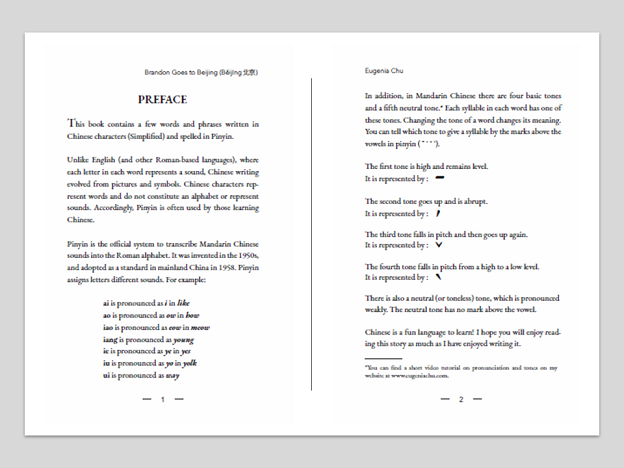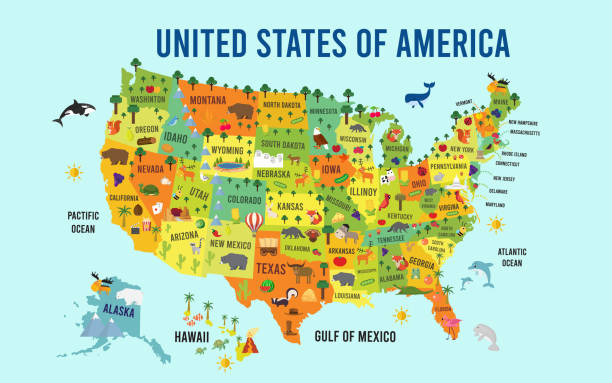Brandon Goes to Beijing (北京)... the second book in the Brandon
series... is a short novel with six chapters, 64 pages in all. In this
book, Brandon and his family fly to China and spend time with their
family. They visit local and historical sites, taste traditional foods,
and have a mystery to solve. Fun times! To learn more
about Brandon Goes to Beijing (北京) and how you can integrate it
with a quick geography lesson, keep reading and leave a comment below!
🍎 Title: Brandon Goes to Beijing (北京)
🍎 Author: Eugenia Chu
🍎 Illustrator: Eliza Hsu Chen
🍎 Publisher: self-published
🍎 Date: August 19, 2019
🍎 Pages: 64
It's important to note... Brandon Goes to Beijing (北京) is a
multilingual story. The text is written in English, Chinese, and Pinyin. If
you have students who are struggling to read in their native language, this
book may be too challenging for them to read independently. If that's the
case, use Brandon Goes to Beijing (北京) as a read-aloud... it's a
high-interest story that children would enjoy listening to.
Disclosure:
Affiliate links
to Amazon are included in this post.
Author's Summary
Brandon and his cousins are on a trip to visit their grandparents in Beijing, China! While bonding with family, practicing Chinese, touring historic sites, and feasting on local dishes, Brandon thinks he sees a tiny panda. However, every time he gets close, the panda disappears! Is Brandon imagining this small creature, or is it real? Will Brandon find out before he has to fly back home? Brandon Goes to Beijing (北京) is a multicultural, multigenerational chapter book that includes some Mandarin Chinese (Simplified) with Pinyin pronunciation, adding layers for those learning or interested in the Chinese language and culture.🍎 Title: Brandon Goes to Beijing (北京)
🍎 Author: Eugenia Chu
🍎 Illustrator: Eliza Hsu Chen
🍎 Publisher: self-published
🍎 Date: August 19, 2019
🍎 Pages: 64
About Brandon Goes to Beijing (北京)
Brandon Goes to Beijing (北京) is a short chapter book that includes
elements from a variety of genres... mystery, fantasy, and realistic
fiction. The majority of Brandon Goes to Beijing (北京) is realistic fiction, inspired by Eugenia Chu's experiences.
There are two small mysteries in the story that need to be solved and a
small touch of fantasy thrown in for fun.
Basic Story Elements
Characters: Brandon, Sean, Kayla, Connor, Mother, Father, Pópo
(婆婆), Gōnggong (公公), and the panda Xióngmāo (熊猫)
Setting: Beijing, China, modern-day
Problems:
1. There is a pet thief stealing animals. He has already stolen several pets and wants to kidnap the panda.
2. The panda is lost and needs help getting back to the zoo.
Solutions:
1. Brandon and his family saw the thief try and steal the panda. They yelled loudly and scared him away. The grown-ups then called the police to have the thief arrested.
2. Brandon and his family help the panda return to his home in the zoo.
To make learning Chinese vocabulary and sight words easier for students, Eugenia Chu included a Chinese pronunciation guide in the front of the book and a glossary in the back. English, Chinese, and Pinyin are included in both. She also posted a video online in which she models how to pronounce certain sounds and words.
Did you enjoy reading about Brandon Goes to Beijing (北京)? If
so, check out these blog posts for more bilingual children's books:
Setting: Beijing, China, modern-day
Problems:
1. There is a pet thief stealing animals. He has already stolen several pets and wants to kidnap the panda.
2. The panda is lost and needs help getting back to the zoo.
Solutions:
1. Brandon and his family saw the thief try and steal the panda. They yelled loudly and scared him away. The grown-ups then called the police to have the thief arrested.
2. Brandon and his family help the panda return to his home in the zoo.
This book, while educational, won't feel like a lesson in the Chinese
language, history, or culture. It's a fun adventure story where your
kids won't even realize they are learning. -Eugenia Chu
Vocabulary Acquisition
When Eugenia Chu wrote Brandon Goes to Beijing (北京), her goal was to introduce new vocabulary words within the context of the story. She didn't write the story in one language on one page and provide its translation on another as many authors do. Instead, she wrote Brandon Goes to Beijing (北京) with English, Chinese, and Pinyin intermingling on the same page and in the same sentences. This helps the reader to learn and remember the new words easier and faster than having to memorize them on a list. If your students are learning Chinese, the Pinyin will help them.. and you... with pronouncing the words.
Mandarin is the official language of China – there are
many other Chinese dialects, but Mandarin is the official
language. Usually, when people say Chinese, they mean
Mandarin. Pinyin is the official system to transcribe
Mandarin Chinese sounds into the Roman
alphabet. -Eugenia Chu
To make learning Chinese vocabulary and sight words easier for students, Eugenia Chu included a Chinese pronunciation guide in the front of the book and a glossary in the back. English, Chinese, and Pinyin are included in both. She also posted a video online in which she models how to pronounce certain sounds and words.
Maps and Geography
In Brandon Goes to Beijing (北京), Brandon and his family do a
lot of traveling and sightseeing. For example, the family starts
in Florida and has to fly to California. From there, they fly to
Beijing. Once they get to Beijing, the family visits several
historical landmarks and tourist attractions.
Great Wall of China... Chángchéng (长城)
The Forbidden City... Zǐjìnchéng (紫禁城)
The Zoo... Dòngwùyuán (动物园)
Pull out a map of the United States. Can your students find
Florida on the map? What is the capital of Florida?
(Tallahassee) Where is California on the map? What is its
capital? (Sacramento) Use the map scale. If Brandon
and his family flew from Tallahassee to Sacramento, how many miles
would that be? What states would they pass through?
What land features and bodies of water would they fly over?
(Decorative children's map of the United States... not for
educational purposes.)
Next, pull out a map of China. Can your students find
Beijing? Beijing is the capital of China. What symbol
marks Beijing as the capital? Brandon and his family visit
the Great Wall, the Forbidden City, the Beijing Zoo, and a few
other places. Are any of those places shown on the
map? If not, have a discussion with your students about the
different types of maps. Remind your students... different
maps serve different purposes. For example, the maps I used
in this post are great for decorative purposes... but not so great
when it comes to learning about geography using map skills.
What kind of map would be the best option for finding the
landmarks Brandon's family went to? Help your students find
those locations on that kind of map.
(Decorative children's map of China... not for educational
purposes.)
To learn more about Brandon Goes to Beijing (北京) and the
other Brandon books, please visit Eugenia Chu's author page: http://eugeniachu.com/
- Book + Craft: Lexi's Special Tooth Fairy Pillow by Ann Morris (English + Spanish)
- Book + Printable: Ritu Weds Chandni by Ameya Narvankar (English + Hindu)
- Book + Craft: It Came from Under the High Chair: A Mystery by Karl Beckstrand (English + Spanish)
- Book: Asha Loves Science: Over in the Meadow by Najla Ahmad (English + Urdu)
- Book + Printable: Great Cape o’ Colors by Karl Beckstrand (English + Spanish)
- Book List: 10+ Children's Books about the Chinese Moon Festival (English + Chinese)











